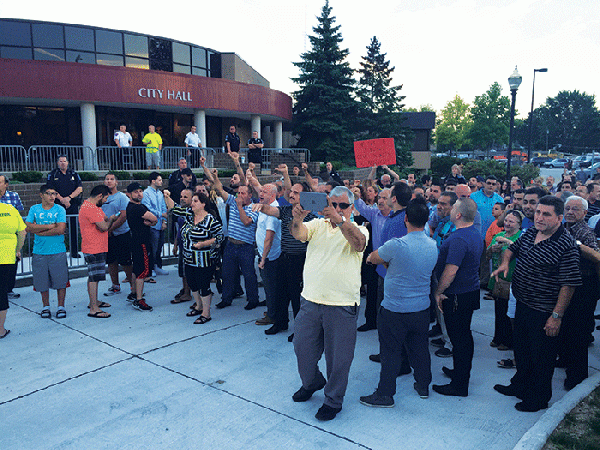
Arab-Chaldean relations have reached a critical point. Repeated attempts by some Chaldeans to attack, smear and ridicule Arab and Muslim Americans can no longer be tolerated. This rising bigotry should be addressed with reason and dialogue within and between both communities.
Members of the Chaldean community took turns trying to convince Sterling Heights city officials to disallow a proposed mosque on 15 Mile Road. One Chaldean resident said all Muslims are killers on food stamps. In an editorial slamming the xenophobic residents opposing the mosque, we stressed that the bigoted Chaldeans who addressed the Sterling Heights City Council do not represent their community. However, it would be undermining the truth to say
Islamophobia and anti-Arab sentiments are not prominent in the Chaldean
community.
The Sterling Heights controversy was not the first incident when certain members of the Chaldean community insulted local Arabs and Muslims.
Last year, a Chaldean state representative, accompanied by two businessmen from the community, attended the annual conference of the American Israeli Public Affairs Committee (AIPAC). They went to pay tribute to Israeli Prime Minister Benjamin Netanyahu, a war criminal who was in Washington to lobby against Iran, a country fighting ISIS on the ground.
The support for AIPAC by some Chaldeans is a stab in the back to Arab Americans, including Christians, from Palestine and Lebanon, whose families were killed and turned into refugees by Israel.
On previous occasions, a prominent Chaldean activist who runs a charter school has wrongly and hatefully said the opening verse of the Quran (Al-Fatiha) condemns Christians and Jews. And an online radio show has called on Chaldeans to boycott Dearborn businesses because they support terrorist groups.
Islamophobia inevitably leads to spreading myths about Dearborn. While it is common to witness White supremacists in far off states make fictitious allegations about Dearborn being ruled by sharia law, it is painful to see our Chaldean neighbors, whom we consider part of our greater community, spew hatred against the city.
It is unacceptable that a Sterling Heights Chaldean goes in front of the City Council telling Muslims who live in the northern suburbs to go to Dearborn, a city that has more churches than mosques.
As a matter of fact, several Chaldeans own liquor stores in “Muslim-ruled” Dearborn.
When Chaldeans make bigoted statements, the hatred does not stop there. It encourages people who are reluctantly Islamophobic to attack Muslims. Before backtracking and voicing support for the mosque, Sterling Heights Mayor Michael Taylor displayed astonishing hatred toward Muslims in the name of Chaldeans.
“I will do everything in my power to protect, support and defend the Chaldean population in Sterling Heights,” Taylor said. “I have nothing to do with the mosque and don’t want it built there.”
An Arab poet from antiquity says, “injustice by friends is more painful than the impact of sharp swords.”
Throughout all of these attacks by Chaldeans against Muslims, Chaldean community leaders and heads of organizations remained silent, validating that Islamophobia is an acceptable position in their community.
This bigotry has caused a backlash among Arabs and Muslims. Some members of our community have made unacceptable, hateful comments about Chaldeans. We condemn these individuals. Their remarks do not represent us.
We need dialogue between Arabs and Chaldeans. But we also need dialogue within our respective communities to tackle bigotry and xenophobia against each other and all other ethnic and religious groups.
We know that most Chaldeans do not identify as Arabs. But they cannot deny that our communities are almost identical. We are in the same businesses; we have the same strong family values; we dress the same and eat the same food; we even have the same English accent.
Our communities are intertwined socially and culturally. We should stand together against our White supremacist foes here and the religious fundamentalists who are killing both Christians and Muslims in Iraq.






Leave a Reply